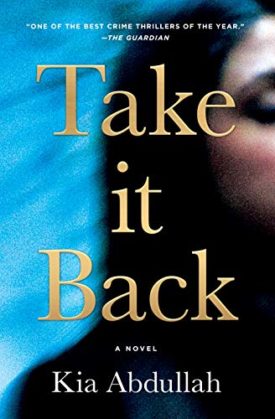 Synopsis:
Synopsis:
The victim: A sixteen-year-old girl with facial deformities accuses four boys of committing an unthinkable act.
The defendants: Four handsome teenage boys from hard-working immigrant families. Their corroborate each other’s versions of what happened that night.
Whose side will you take?
Zara Kaleel, a former barrister battling her own demons, is one of London’s brightest young legal minds. A successful barrister turned victim’s advocate, she takes up Jodie Wolfe’s case because she believes her, even if those closest to Jodie, even her best friend, do not. Together they enter the most explosive criminal trial of the year during which ugly divisions within British society are exposed.
As everything around Zara begins to unravel, she grows even more determined to get justice for Jodie — to find the truth in the face of public outcry.
But at what cost? As issues of sex, race, and social justice collide, the most explosive criminal trial of the year builds to a shocking conclusion.
Review:

Take It Back is centered around Zara Kaleel who left her job as a barrister with a prominent, high-powered London law firm when she awoke one day to find that she had become the person she used to hate: validated by her profession, arrogant, and self-important. She was also mourning her father and the fact that they remained estranged when he died. She lost interest in her work, and thought she might be able to find herself by working closely with vulnerable women. Abandoning her career disappointed her family, but she believes they were more upset about her decision to leave her marriage. Now she serves as an independent sexual violence advisor at Artemis House, a sexual assault referral center, where her knowledge of the legal system proves invaluable. She supports rape victims, working to ensure that the facts are presented clearly and comprehensively in readily-understood terms, and helping them navigate the justice system.
Zara is stunned when Jodie Wolfe, sixteen years old, arrives to meet with her. Jodie’s right eye is all but hidden by excess skin hanging from her forehead, her lips and chin are also covered in heavy folds of skin, and her nose is unnaturally small. Jodie’s facial deformity renders her speech difficult to understand, but she immediately finds her way into Zara’s heart.
I want to take it back, rang her sole desperate thought. Please, God. Please. I just want to take it back.
Jodie explains that she was raped five days earlier when she attended a party for the very first time. She relates that her friend Nina was dancing, so she went outside. And one of the boys there, Amir Rabbani, asked to kiss her. Jodie has been a victim of bullying and taunting her entire life, so the attention shown her was new and exciting. But then they were joined by his friends, Hassan Tanweer, Mohammed Ahmed, and Farid Khan, who violently assaulted her. Zara is stunned by Jodie’s story. “Four Muslim boys had raped a disabled white girl.”
Jodie’s accusation takes Zara on a journey for which she is not prepared. She joined the referral center to perform meaningful work and she is accustomed to hearing heartbreakingly painful stories. Her legal background prepared her to remain composed and dispassionate, but as she listened to Jodie “the buffer was breached.” Jodie agrees to let Zara accompany her to the policy department to make a formal statement, even though Zara secretly hopes that Jodie will decide not to “subject herself to the disruptive, corrosive justice system that left victims so often bruised. The law stress-tested every piece of evidence and that included the victim — probing, pushing and even bullying until the gaps became apparent.”
A media firestorm erupts when the boys face criminal charges. Zara must deal with the publicity the case generates, maneuver the legal system on behalf of and support Jodie, and prepare her to not just recount her experience during the direct examination at trial, but withstand cross-examination by four different defense counsels. The four boys are close friends and their futures hang in the balance. The case divides the community along not just socioeconomic lines. Zara’s friends and family are appalled by her role in the case. Her good friend Safran expresses concern about what the case will do to Muslims. He pointedly tells Zara, “You’re a Muslim holding the hand of a girl accusing four Muslim boys of rape. You really think you’ll stay in the background?” Zara finds herself in an ethical and moral quagmire. Should she remove herself from the case because of the potential damage it will do to her community and potentially alienate her from her remaining family members? Or see it through because she believes “Jodie deserves her day in court.” And then there is the matter of Jodie’s recitation of the events of that fateful night. It is inconsistent.
Take It Back is a shocking and riveting legal drama that is tautly constructed, fast-paced, and filled with credible, intriguing characters. Zara is a compelling protagonist. She’s a woman committed to using her intellect, education, and professional prowess to perform important work that will not only fulfill her as being a barrister never did, but help others. She must negotiate the chasm that her choices have created between her and her family, traditionalists who want her to lead the kind of life for which her parents prepared her, as do her female relatives. But that life holds no interest for Zara and her relationships with her brother, now the head of the family, and her mother are fraught. Zara’s coping mechanisms are also examined. Jodie is an equally fascinating, fully developed character. She is a teenage girl who has suffered greatly because of her appearance, as well as her home life. She has never had real friends or been accepted by her schoolmates, never been the object of positive male attention or interest, and wants desperately to belong. But would she destroy the lives of four of her classmates by concocting unfounded allegations in order to get the attention she craves?
Abdullah credibly examines the evidentiary complexities of the case, its impact on those involved in it, and the limitations of the legal system, as well as its far-reaching social and cultural implications. She injects shocking revelations at expertly-timed intervals and keeps readers guessing as to the truth until the book’s shocking conclusion.
Take It Back is an impressive debut — an intense, thought-provoking, and timely legal thriller on par with the work of masters like John Grisham and Scott Turow that will leave readers clamoring for Abdullah’s next book.
Also by Kia Abdullah
:




Comments are closed.